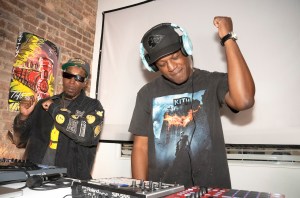Chappell Roan Sparked a Conversation On Healthcare and This Nonprofit Responded: ‘Now’s the Time’
Written by djfrosty on May 30, 2025

When Chappell Roan accepted her trophy for best new artist at the 2025 Grammy Awards in February, she asked a question that quickly went viral. The pop star used her speech to advocate for livable wages and health care for recording artists, concluding with the line, “Labels, we got you, but do you got us?”
Tatum Allsep, founder and CEO of the nonprofit Music Health Alliance, posted the speech to her Instagram account that night. “THIS!!!! Music Health Alliance has got you, your band, crew, team, songwriters, engineers, etc. #HealTheMusic,” read her caption.
“At first, I was jumping up and down and elated,” Allsep recalls, “and then, after I started reading the articles coming out, I was like, ‘Wait a minute. Chappell lost a record deal in 2020. We were here.’ We could have helped her in two seconds, but she didn’t know. And that’s on us.”
Trending on Billboard
By Feb. 13, Music Health Alliance and Universal Music Group partnered to launch the Music Industry Mental Health Fund, with the goal of providing mental health services to music industry professionals. The two organizations first started working together during the pandemic, creating a concierge program for UMG artists, songwriters and employees. Yet the Mental Health Fund is the latest step in Allsep’s decadeslong career as an advocate for health care in the industry, and on June 4, she will be honored with the Impact Award at Billboard’s Country Power Players event in Nashville.
“[Awareness] has got to come from the industry internally,” she says. “Just letting people know that we’re a safe space and we exist. All the funds we raise go right back into our programs and services. We want it to be that way, but we also want those that need us to know we’re here.”
How were the Music Health Alliance and UMG able to move so quickly following Chappell Roan’s speech?
We were already working with [UMG], and six months before the Grammys, we had started to talk about doing something in the mental health space. Chappell’s speech [made us say], “OK, now’s the time. This is what we need to do.” It was a great opportunity for the industry, for the label and for us to do something really meaningful at a time when people were listening.
You founded the Music Health Alliance in 2013. Why is it still necessary for an artist like Roan to give the speech she did 12 years later?
It’s not black and white. It’s a complicated issue. You get health insurance by being an employer of an organization — and you can negotiate anything, I understand that. But talking about Chappell specifically, if she was going to be an employee of UMG, they would own her creativity. And that’s suffocating for artists. We’ve got to prioritize their health, and that needs to be equally as important as making sure their vocal cords work when they’re going out.
What kind of uptick in artists reaching out to you did you experience following the formation of the Mental Health Fund?
For February, March and April, it was a 250% increase over last year. And that’s specifically for mental health.
The first Music Health Alliance fundraising event was hosted with Jack Clement for his “living wake” in 2013. What are more recent examples of working alongside an artist to create change?
Dierks Bentley is a great example. We went to college together and started in the music industry the same week. He was in the tape room at [The Nashville Network] and I was the receptionist at MCA Records in the promotion department, and we thought we had arrived. I think we were each making like $12,000 a year. And so, when I started Music Health Alliance, he was one of the first people that was like, “I support this.” About two years in, his team called and they were like, “Dierks wants to provide group health insurance for his band.” And I’m like, “I don’t know anything about group health insurance.” That was over Christmas break of 2016. By Jan. 1, we had a game plan, and by Feb. 1, his band and team were fully insured.
What are the goals for the Mental Health Fund in 2025 and beyond?
Where there’s a gap and a really serious need is for outpatient counseling. Vetting counselors is huge. You can’t just watch a 30-minute video and be music industry-informed. You have to understand the creative brain, and that is not the same. Once [an artist or executive] knows that they can trust us, we can help them for as long as they need.
This article originally appeared in the May 31, 2025 issue of Billboard.

 State Champ Radio
State Champ Radio 





